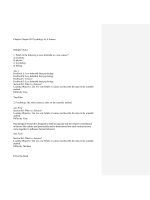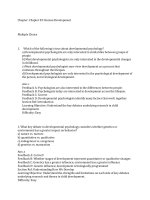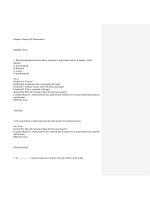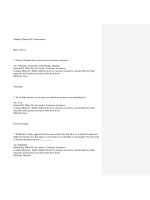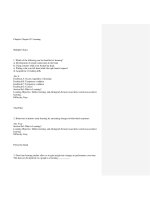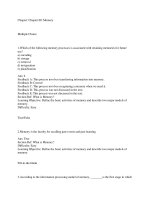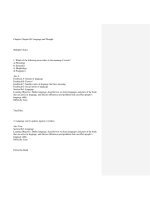TestBank psychology around us 2nd edition comer ch01
Bạn đang xem bản rút gọn của tài liệu. Xem và tải ngay bản đầy đủ của tài liệu tại đây (681.61 KB, 98 trang )
Chapter: Chapter 01: Psychology: Yesterday and Today
Short Answer
1. By definition, what do psychologists study?
Ans: Behavior and mental processes
Section Ref: What is Psychology?
Learning Objective: Define psychology, and describe the goals and levels of analysis
psychologists use.
Difficulty: Medium
True/False
2. Mental processes describe the activity of our brains when we are engaged in thinking.
Ans: True
Section Ref: What is Psychology?
Learning Objective: Define psychology, and describe the goals and levels of analysis
psychologists use.
Difficulty: Easy
Fill-in-the-blank
3. During psychology’s early history, the primary method for exploring internal mental processes
was to observe outward __________.
Ans: behavior
Section Ref: What is Psychology?
Learning Objective: Define psychology, and describe the goals and levels of analysis
psychologists use.
Difficulty: Medium
Commented [w1]: Should be: thinking, observing the
environment, and using language.
Short Answer
4. What is one direct method of investigating internal mental processes that has resulted from
technological advances within psychology?
Ans: brain imaging
Section Ref: What is Psychology?
Learning Objective: Define psychology, and describe the goals and levels of analysis
psychologists use.
Difficulty: Hard
Essay
5. Name 2 of the 4 goals discussed in the text that psychologists have in mind when studying
mental processes and behavior.
Ans: Identify 2 of the following goals: description, explanation, prediction, and control
Section Ref: What is Psychology?
Learning Objective: Define psychology, and describe the goals and levels of analysis
psychologists use.
Difficulty: Medium
Multiple Choice
6. What goal of psychology is associated with the desire to limit or increase behavior?
a) description
b) explanation
c) prediction
d) control
Ans: d
Feedback A: Description does not increase or limit behavior.
Feedback B: Explanation answers the question “why”.
Feedback C: Prediction enables researchers to determine when a behavior will occur.
Feedback D: Correct!
Section Ref: What is Psychology?
Learning Objective: Define psychology, and describe the goals and levels of analysis
psychologists use.
Difficulty: Easy
True/False
7. The levels of behavioral analysis include the brain, the individual, and the group.
Ans: True
Section Ref: What is Psychology?
Learning Objective: Define psychology, and describe the goals and levels of analysis
psychologists use.
Difficulty: Easy
Psychologists are interested in studying individual level behavior.
Ans: True
Section Ref: What is Psychology?
Learning Objective: Define psychology, and describe the goals and levels of analysis
psychologists use.
Difficulty: Easy
Because psychological research is limited to the study of the brain, very few psychologists
consider group level factors to be important determinants of behavior.
Ans: False
Section Ref: What is Psychology?
Learning Objective: Define psychology, and describe the goals and levels of analysis
psychologists use.
Difficulty: Easy
Essay
Describe the three levels of analysis that are apparent in psychological research.
Ans: (1) Brain – At the brain level of analysis, psychologists examine how brain structure and
brain cell activity differ from person to person and situation to situation. (2) Person - At the
person level of analysis, psychologists examine how the content of the individual’s mental
processes forms and influences behavior. (3) Group - At the brain level of analysis, psychologists
examine how social and cultural environments shape behavior.
Section Ref: What is Psychology?
Commented [w2]: Change to: In order to describe, explain,
predict, or control mental processes and behaviors we must
include analysis of
Commented [w3]: This is a poor question. I would suggest:
Psychologists analyze how the brain, the individual, and the group
influence each other to reveal much about how we function. Ans.
True
Learning Objective: Define psychology, and describe the goals and levels of analysis
psychologists use.
Difficulty: Medium
Multiple Choice
Dr. Sandoval is conducting a study of internet trolls. His goal is to explore whether certain
personality traits such as introversion are common to most trolls. This is an example of a
psychological study that is focused on the _______ level of analysis.
a) brain
b) person
c) group
d) contextual
Ans: b
Feedback A: The researchers are not examining brain structure or activity.
Feedback B: Correct!
Feedback C: The researchers are not examining how social and cultural environments shape
behavior.
Feedback D: The researchers are not examining how contextual effects, such as social and
cultural environments shape behavior.
Section Ref: What is Psychology?
Learning Objective: Define psychology, and describe the goals and levels of analysis
psychologists use.
Difficulty: Medium
Dr. Krahn is conducting a study of internet trolls. He is interested in investigating the
neurological effects of trolling. He invites his subjects to the laboratory and collects
neuroimaging data which they are trolling. This is an example of a psychological study that is
focused on the _______ level of analysis.
a) brain
b) person
c) group
d) contextual
Ans: a
Feedback A: Correct!
Feedback B: The researchers are not examining how an individual’s mental processes forms and
influences behavior.
Feedback C: The researchers are not examining how social and cultural environments shape
behavior.
Feedback D: The researchers are not examining how contextual effects, such as social and
cultural environments shape behavior.
Section Ref: What is Psychology?
Learning Objective: Define psychology, and describe the goals and levels of analysis
psychologists use.
Difficulty: Medium
Fill-in-the-blank
8. A large group of people with a set of shared beliefs and practices is referred to as a(n)
__________.
Ans: culture
Section Ref: What is Psychology?
Learning Objective: Define psychology, and describe the goals and levels of analysis
psychologists use.
Difficulty: Medium
Short Answer
9. At what level of behavioral analysis does a psychologist analyze the content of mental
processes including emotions, thoughts, and ideas?
Ans: The individual
Section Ref: What is Psychology?
Learning Objective: Define psychology, and describe the goals and levels of analysis
psychologists use.
Difficulty: Medium
Essay
10. Why is behavioral analysis incomplete without an examination of the group?
Ans: Humans are shaped by their social environments and those environments change over time.
Section Ref: What is Psychology?
Learning Objective: Define psychology, and describe the goals and levels of analysis
psychologists use.
Difficulty: Hard
Commented [w4]: Actual definition: a set of
common beliefs, practices, values, and history that are
transmitted across generations
Multiple Choice
11. Psychology is defined as:
a) the science of behavior
b) the study of mental processes
c) the study of mental disorders and their treatment
d) the science of behavior and mental processes
Ans: d
Feedback A: Incorrect. Psychology is defined as the study of behavior and mental processes.
Its subject matter is not limited to behavior.
Feedback B: Incorrect. Psychology is defined as the study of behavior and mental processes.
Its subject matter is not limited to mental processes.
Feedback C: Incorrect. Psychology is defined as the study of behavior and mental processes.
Both normal and disordered thought and behavior are included.
Feedback D: Correct!
Section Ref: What Is Psychology?
Learning Objective: Define psychology, and describe the goals and levels of analysis that
psychologists use.
Difficulty Level: Easy
12. How has the study of the mind changed across psychology’s history?
a) Psychologists have largely abandoned the study of the mind in favor of the examination of
objective behavior.
b) Psychologists have found increasingly direct ways to study the mind.
c) Psychologists have only very recently started to study the mind along with behavior.
d) To eliminate biases, psychologists have increasingly relied on indirect methods of studying
the mind.
Ans: b
Feedback A: Incorrect. The recent advent of brain imaging techniques has encouraged
continued study of mental processes in psychology.
Feedback B: Correct!
Feedback C: Incorrect. Internal mental processes were examined during psychology’s early
history.
Feedback D: Incorrect. Psychologists have found increasingly direct ways to study the mind,
such as brain imaging.
Section Ref: What Is Psychology?
Learning Objective: Define psychology, and describe the goals and levels of analysis that
psychologists use.
Difficulty Level: Hard
13. Your text lists each of the following as a goal of psychology EXCEPT:
a) description
b) control
c) analysis
d) explanation
Ans: c
Feedback A: Incorrect. Description is listed as one of psychology’s goals. Analysis is not.
Feedback B: Incorrect. Control is listed as one of psychology’s goals. Analysis is not.
Feedback C: Correct!
Feedback D: Incorrect. Explanation is listed as one of psychology’s goals. Analysis is not.
Section Ref: What Is Psychology?
Learning Objective: Define psychology, and describe the goals and levels of analysis that
psychologists use.
Difficulty Level: Easy
14. Which of the following goals of psychology is CORRECTLY matched with a description?
a) prediction – changing how often behavior occurs
b) control – making careful observations regarding behavior
c) description – determining the circumstances in which behavior is likely to occur
d) explanation – identifying the causes of behavior
Ans: d
Feedback A: Incorrect. Prediction involves determining the circumstances in which behavior
might occur.
Feedback B: Incorrect. Control involves changing how often behavior occurs.
Feedback C: Incorrect. Description involves making careful observations regarding behavior.
Feedback D: Correct!
Section Ref: What Is Psychology?
Learning Objective: Define psychology, and describe the goals and levels of analysis that
psychologists use.
Difficulty Level: Easy
15. Which of the following goals of psychology is CORRECTLY matched with an example?
a) description – A research assistant records the number of aggressive acts children display
during a 15-minute recess period.
b) prediction – A sports psychologist determines whether increased testosterone produces
increased aggression among student athletes.
Commented [w5]: This type of question drives me crazy – it’s
not conceptual and it’s strict memorization.
c) explanation – A team of educators develops a program to decrease aggression among
schoolchildren.
d) control – A researcher assesses whether adults are more likely to feel depressed when they
have experienced recent major losses than when they have not.
Ans: a
Feedback A: Correct!
Feedback B: Incorrect. Determining whether increased testosterone produces increased
aggression entails identifying the causes of behavior, thus illustrating explanation, not prediction.
Feedback C: Incorrect. A program to decrease aggression among schoolchildren is intended to
change the frequency of behaviors, thus illustrating control, not explanation.
Feedback D: Assessing whether adults are more likely to feel depressed when they have
experienced losses involves determining the circumstances in which behavior might occur. It
exemplifies prediction, not control.
Section Ref: What Is Psychology?
Learning Objective: Define psychology, and describe the goals and levels of analysis that
psychologists use.
Difficulty Level: Hard
16. Which of the following statements is TRUE regarding the levels of analysis in psychology?
a) Each thought or behavior occurs at one of the following levels: the level of the brain, the level
of the person, or the level of the group.
b) The level of the brain is the most important level of analysis in psychology.
c) Thoughts and behaviors are analyzed at the group level by sociologists and anthropologists,
not by psychologists.
d) All thoughts and behaviors occur at all three levels simultaneously.
Ans: d
Feedback A: Incorrect. All behaviors and mental processes occur at all three levels
simultaneously.
Feedback B: Incorrect. All three levels are considered important in psychology.
Feedback C: Incorrect. Psychologists also consider the group level in their analyses of thought
and behavior.
Feedback D: Correct!
Section Ref: What Is Psychology?
Learning Objective: Define psychology, and describe the goals and levels of analysis that
psychologists use.
Difficulty Level: Medium
17. How has psychology’s focus on the different levels of analysis changed over the history of
the discipline?
a) Brain-level and group-level analyses are more prevalent in today’s psychology than they were
in the past.
b) Group-level analyses are less prevalent in today’s psychology than they were in the past.
c) Individual-level analyses are more prevalent in today’s psychology than they were in the past.
d) Individual-level analyses are more prevalent in today’s psychology than they were in the past,
while group-level analyses are less common now.
Ans: a
Feedback A: Correct!
Feedback B: Incorrect. The social and cultural influences on thought and behavior are receiving
increasing attention in psychology.
Feedback C: Incorrect. The text does not suggest an increasing focus on the level of the
individual in psychology.
Feedback D: Incorrect. The text does not suggest an increasing focus on the level of the
individual in psychology. In addition, the social and cultural influences on thought and behavior
are receiving increasing attention in psychology.
Section Ref: What Is Psychology?
Learning Objective: Define psychology, and describe the goals and levels of analysis that
psychologists use.
Difficulty Level: Hard
18. Which level of analysis in psychology is CORRECTLY matched with an example?
a) Brain level -- At low doses, cocaine can improve performance on visual attention tasks, such
as detecting specific stimuli appearing on a computer screen.
b) Individual level -- Cocaine abuse is associated with a history of violence and sexual abuse in
the family.
c) Brain level -- Cocaine exerts its effects by prolonging the presence of specific chemicals at the
junctions between nerve cells.
d) Group level -- Cocaine abuse is associated with high levels of the personality trait of
neuroticism and with low levels of the trait of conscientiousness.
Ans: c
Feedback A: Incorrect. Mental processes such as attention are individual- rather than brainlevel variables.
Feedback B: Incorrect. Family variables reflect group- rather than individual-level analyses.
Feedback C: Correct!
Feedback D: Incorrect. The group level involves examining social and cultural influences on
thought and behavior. Personality traits are individual-level variables.
Section Ref: What Is Psychology?
Learning Objective: Define psychology, and describe the goals and levels of analysis that
psychologists use.
Difficulty Level: Hard
19. Based on your text’s discussion, which statement best expresses the relationship between a
culture and a group?
a) A culture is the same thing as a group.
b) A culture refers to the practices and beliefs of a group.
c) Groups are subsets of a culture.
d) Cultures are subsets of groups.
Ans: b
Feedback A: Incorrect. A culture refers to the practices and beliefs of a group.
Feedback B: Correct!
Feedback C: Incorrect. A culture refers to the practices and beliefs of a group.
Feedback D: Incorrect. A culture refers to the practices and beliefs of a group.
Section Ref: What Is Psychology?
Learning Objective: Define psychology, and describe the goals and levels of analysis that
psychologists use.
Difficulty Level: Medium
20. Which Greek philosopher’s theory suggested that our physical and psychological health is
influenced by humours, also known as bodily fluids?
a) Hippocrates
b) Socrates
c) Plato
d) Aristotle
Ans: a
Feedback A: Correct!
Feedback B: Believed that “truth” lies in the mind
Feedback C: Believed that ideas and concepts are pure and signify an ultimate reality
Feedback D: Promoted empirical investigation
Section Ref: Psychology’s Roots in Philosophy.
Learning Objective: Describe the influences of early myths and ancient Greek philosophies on
psychology.
Difficulty: Medium
True/False
20. The history of psychology (and most other sciences) started with the history of philosophy.
Ans: True
Section Ref: Psychology’s Roots in Philosophy.
Learning Objective: Describe the influences of early myths and ancient Greek philosophies on
psychology.
Difficulty: Easy
Fill-in-the-blank
21. Following an earthquake or other disaster, some primitive cultures may attribute human
qualities to such a natural event because they believe the “earth spirits are angry”. This example
illustrates a(n) __________.
Ans: myth
Section Ref: Psychology’s Roots in Philosophy.
Learning Objective: Describe the influences of early myths and ancient Greek philosophies on
psychology.
Difficulty: Medium
Short Answer
22. What attribute of Greek culture was essential to forming intellectual dialogue that resulted in
a flow of ideas?
Ans: Open, critical discussions where anyone could challenge prevailing doctrines
Section Ref: Psychology’s Roots in Philosophy.
Learning Objective: Describe the influences of early myths and ancient Greek philosophies on
psychology.
Difficulty: Hard
Essay
23. How is psychological science of today similar to primitive myths?
Ans: Both approaches are attempts to describe, explain, predict, and control our reality.
Section Ref: Psychology’s Roots in Philosophy.
Learning Objective: Describe the influences of early myths and ancient Greek philosophies on
psychology.
Difficulty: Medium
Multiple Choice
Which of the following statements about science and myths is true?
a) Science and myths both represent ways to make sense out of the natural world.
b) Scientific ideas are tested and scrutinized in a manner that is similar to way myths are
evaluated.
c) Many people believe in science, but only a few people believe in myths.
d) The purpose of myths, but not science, is to describe, predict, explain, and control the world.
Ans: a
Feedback A: Correct!
Feedback B: Myths are not scrutinized as heavily as scientific principles.
Feedback C: The textbook makes no mention on differences in the popularity of myths versus
scientific ideas.
Feedback D: Both myths and science seek to describe, predict, explain, and control the world.
Section Ref: Psychology’s Roots in Philosophy.
Learning Objective: Describe the influences of early myths and ancient Greek philosophies on
psychology.
Difficulty: Medium
Elsa was listening to a John Mayer song on her iPod. She enjoyed the song so much she clicked
on the genius button and had her iPod generate a new playlist of songs that are similar to the one
she was listening to. Elsa was so thrilled with her new playlist she kissed her iPod and praised it
for “knowing her” so well. This human tendency to project our mental and emotional
characteristics onto nonhuman objects is known as _______.
a) egocentrism
b) empiricism
c) anthropomorphism
d) structuralism
Ans: c
Feedback A: This term is not discussed in the textbook.
Feedback B: The example given demonstrates anthropomorphism not empiricism.
Feedback C: Correct!
Feedback D: The example given demonstrates anthropomorphism not structuralism.
Section Ref: Psychology’s Roots in Philosophy.
Learning Objective: Describe the influences of early myths and ancient Greek philosophies on
psychology.
Difficulty: Hard
Psychologists believe that _________ allows people to feel as though they have gained some
sense of control over their environment.
a) structuralism
b) functionalism
c) egocentrism
d) anthropomorphism
Ans: d
Feedback A: Structuralism is an early theoretical point of view in psychology, not a phenomenon
that increases one’s sense of control over the environment.
Feedback B: Functionalism is an early theoretical point of view in psychology, not a
phenomenon that increases one’s sense of control over the environment.
Feedback C: This term is not discussed in the textbook.
Feedback D: Correct!
Section Ref: Psychology’s Roots in Philosophy.
Learning Objective: Describe the influences of early myths and ancient Greek philosophies on
psychology.
Difficulty: Hard
According to Charles Darwin’s theory of evolution, _______ determines which
variations of life survive over time and which fall out of existence.
a) structuralism
b) functionalism
c) natural selection
d) anthropomorphism
Ans: c
Feedback A: Structuralism is an early theoretical point of view in psychology, not a phenomenon
that determines which variations of life survive over time and which fall out of existence.
Feedback B: Functionalism is an early theoretical point of view in psychology, not a
phenomenon that determines which variations of life survive over time and which fall out of
existence.
Feedback C: Correct!
Feedback D: Anthropomorphism does not determine which variations of life survive over time
and which fall out of existence.
Section Ref: Psychology’s Roots in Philosophy.
Learning Objective: Describe the influences of early myths and ancient Greek philosophies on
psychology.
Difficulty: Easy
Define and give an example of the concept of anthropomorphism.
Ans: Anthropomorphism is the human tendency to project our mental and emotional
characteristics onto nonhuman objects. When people treat their iPods, computers, or other
inanimate objects like people, anthropomorphism is evident. For example, person who curses at
his or her computer when it locks up is demonstrating anthropomorphism.
Section Ref: Psychology’s Roots in Philosophy.
Learning Objective: Describe the influences of early myths and ancient Greek philosophies on
psychology.
Difficulty: Hard
24. Which philosopher believed that we can use logical or rational thinking to discover “core
ideas” buried within the human soul?
a) Hippocrates
b) Socrates
c) Plato
d) Aristotle
Ans: c
Feedback A: Suggested that our physical and psychological health in influenced by humours
Feedback B: Believed that “truth” lies in the mind
Feedback C: Correct!
Feedback D: Promoted empirical investigation
Section Ref: Psychology’s Roots in Philosophy.
Learning Objective: Describe the influences of early myths and ancient Greek philosophies on
psychology.
Difficulty: Hard
True/False
25. Socrates believed that “truth” is an objective concept that is not dependent on perception.
Ans: False
Feedback: Believed that “truth” was highly dependent upon our perceived, or subjective states
Section Ref: Psychology’s Roots in Philosophy.
Learning Objective: Describe the influences of early myths and ancient Greek philosophies on
psychology.
Difficulty: Medium
Fill-in-the-blank
26. The first philosopher to promote empirical or testable investigations of the natural world was
__________.
Ans: Aristotle
Section Ref: Psychology’s Roots in Philosophy.
Learning Objective: Describe the influences of early myths and ancient Greek philosophies on
psychology.
Difficulty: Easy
Short Answer
27. According to Hippocrates, what are humours?
Ans: Bodily fluids that determine a person’s character and well-being
Section Ref: Psychology’s Roots in Philosophy.
Learning Objective: Describe the influences of early myths and ancient Greek philosophies on
psychology.
Difficulty: Easy
Essay
28. Describe how the work of Aristotle influenced the development of psychology as a scientific
discipline.
Ans: Promoting the empirical investigation of topics such as sensations and learning laid the
foundations of the scientific investigation of behavior.
Section Ref: Psychology’s Roots in Philosophy.
Learning Objective: Describe the influences of early myths and ancient Greek philosophies on
psychology.
Difficulty: Hard
Multiple Choice
29. How do the goals of early religious practices compare to the goals of contemporary
psychology?
a) The goals of early religious practices contradict those of contemporary psychology.
b) The goals of early religious practices are unrelated to those of contemporary psychology.
c) The goals of early religious practices overlap a little with those of contemporary psychology.
d) The goals of early religious practices are quite similar to those of contemporary psychology.
Ans: d
Feedback A: Incorrect. The goals of early religious practices were similar to those of
psychology: to describe, predict, explain, and control reality.
Feedback B: Incorrect. The goals of early religious practices were similar to those of
psychology: to describe, predict, explain, and control reality.
Feedback C: Incorrect. The goals of early religious practices were similar to those of
psychology: to describe, predict, explain, and control reality.
Feedback D: Correct!
Section Ref: Psychology’s Roots in Philosophy
Learning Objective: Describe the influences of early myths and ancient Greek philosophies on
psychology.
Difficulty Level: Medium
30. Approximately when did Greek thinkers begin to substitute natural for supernatural
explanations of nature and reality?
a) in the seventh and eighth centuries BCE
b) in the fourth and fifth centuries BCE
c) in the first and second centuries BCE
d) in the first and second centuries AD
Ans: b
Feedback A: Incorrect. Greek thinkers began to move away from supernatural explanations in
the fourth and fifth centuries BCE.
Feedback B: Correct!
Feedback C: Incorrect. Greek thinkers began to move away from supernatural explanations in
the fourth and fifth centuries BCE.
Feedback D: Incorrect. Greek thinkers began to move away from supernatural explanations in
the fourth and fifth centuries BCE.
Section Ref: Psychology’s Roots in Philosophy
Learning Objective: Describe the influences of early myths and ancient Greek philosophies on
psychology.
Difficulty Level: Hard
31. __________ is defined as the study of knowledge and reality.
a) Philosophy
Commented [w6]: Consider change to myths and rituals
b) Science
c) Psychology
d) Mythology
Ans: a
Feedback A: Correct!
Feedback B: Incorrect. Philosophy, not science, is defined as the study of knowledge and
reality.
Feedback C: Philosophy, not psychology, is defined as the study of knowledge and reality.
Feedback D: Philosophy, not mythology, is defined as the study of knowledge and reality.
Section Ref: Psychology’s Roots in Philosophy
Learning Objective: Describe the influences of early myths and ancient Greek philosophies on
psychology.
Difficulty Level: Easy
32. The view that theories are always tentative may be traced back to:
a) Greece
b) Rome
c) the Renaissance
d) the late nineteenth century
Ans: a
Feedback A: Correct!
Feedback B: Incorrect. Greek thinkers recognized that theories are never final.
Feedback C: Incorrect. Greek thinkers recognized that theories are never final.
Feedback D: Incorrect. Greek thinkers recognized that theories are never final.
Section Ref: Psychology’s Roots in Philosophy
Learning Objective: Describe the influences of early myths and ancient Greek philosophies on
psychology.
Difficulty Level: Easy
33. Which Greek philosopher is CORRECTLY matched with a key idea?
a) Hippocrates – suggested that we could use reasoning to discover the truth
b) Socrates – proposed that well-being and personality is influenced by humors
c) Plato – one of the first to promote empirical study of the natural world
d) Aristotle – concluded that humans are closely related to animals
Ans: d
Feedback A: Incorrect. Hippocrates proposed that well-being and personality is influenced by
humors. Plato promoted reason.
Feedback B: Incorrect. Hippocrates, not Socrates, proposed that well-being and personality is
influenced by humors.
Feedback C: Incorrect. Plato promoted reason, rather than empirical observation.
Feedback D: Correct!
Section Ref: Psychology’s Roots in Philosophy
Learning Objective: Describe the influences of early myths and ancient Greek philosophies on
psychology.
Difficulty Level: Hard
34. Whereas the Greek philosopher ________correctly identified the brain as the organ of
mental life, _________ believed that the brain was of minor importance.
a) Aristotle; Hippocrates
b) Plato; Aristotle
c) Hippocrates; Aristotle
d) Hippocrates; Socrates
Ans: c
Feedback A: Incorrect. Hippocrates, not Aristotle, correctly identified the brain as the seat of
mental life. Aristotle, not Hippocrates, believed the brain was of minor importance.
Feedback B: Incorrect. Hippocrates, not Plato, correctly identified the brain as the seat of mental
life.
Feedback C: Correct!
Feedback D: Incorrect. Aristotle, not Socrates, believed the brain was of minor importance.
Section Ref: Psychology’s Roots in Philosophy
Learning Objective: Describe the influences of early myths and ancient Greek philosophies on
psychology.
Difficulty Level: Medium
35. One similarity between Hippocrates and Aristotle is that they both:
a) proposed influential theories of personality
b) believed that theories should be tested empirically
c) believed that reason could uncover ultimate truths
d) viewed the brain as the seat of mental life
Ans: b
Feedback A:
empirically.
Feedback B:
Feedback C:
empirically.
Feedback D:
empirically.
Section Ref:
Incorrect. Hippocrates and Aristotle both believed that theories should be tested
Correct!
Incorrect. Hippocrates and Aristotle both believed that theories should be tested
Incorrect. Hippocrates and Aristotle both believed that theories should be tested
Psychology’s Roots in Philosophy
Learning Objective: Describe the influences of early myths and ancient Greek philosophies on
psychology.
Difficulty Level: Medium
36. With respect to the way that we acquire knowledge, _______ emphasized the role of the
mind and reasoning, whereas ________ pointed to the role of sensory experience.
a) Hippocrates; Socrates
b) Aristotle; Hippocrates
c) Plato; Aristotle
d) Aristotle; Plato
Ans: c
Feedback A: Incorrect. With respect to knowledge acquisition, Plato emphasized reasoning,
whereas Aristotle emphasized sensory experience.
Feedback B: Incorrect. With respect to knowledge acquisition, Plato emphasized reasoning,
whereas Aristotle emphasized sensory experience.
Feedback C: Correct!
Feedback D: Incorrect. With respect to knowledge acquisition, Plato, not Aristotle, emphasized
reasoning. Aristotle, not Plato, emphasized sensory experience.
Section Ref: Psychology’s Roots in Philosophy
Learning Objective: Describe the influences of early myths and ancient Greek philosophies on
psychology.
Difficulty Level: Medium
37. In 1879, what German physiologist opened the first laboratory exclusively dedicated to the
study of psychology?
a) Freud
b) Skinner
c) Helmholtz
d) Wundt
Ans: d
Feedback A: Associated with the psychoanalytic approach.
Feedback B: Associated with behaviorism
Feedback C: Helmholtz did not open the first laboratory.
Feedback D: Correct!
Section Ref: The Early Days of Psychology
Learning Objective: Name important early psychologists and describe their major theories and
research methods.
Difficulty: Medium
True/False
38. By the 1800s, human beings were considered to be outside the influence of fixed natural
laws.
Ans: False
Feedback: The universe and human beings were believed to be machines that were subject to
fixed laws.
Section Ref: The Early Days of Psychology
Learning Objective: Name important early psychologists and describe their major theories and
research methods.
Difficulty: Hard
Fill-in-the-blank
39. The term used to describe the behaviors and mental processes of which we are aware is
__________.
Ans: consciousness
Section Ref: The Early Days of Psychology
Learning Objective: Name important early psychologists and describe their major theories and
research methods.
Difficulty: Medium
Short Answer
40. What theory postulates that all life on Earth is related and that humans are just one outcome
of many variations from a common ancestor?
Ans: Evolution
Section Ref: The Early Days of Psychology
Learning Objective: Name important early psychologists and describe their major theories and
research methods.
Difficulty: Easy
Describe the introspection techniques used in Edward Titchener’s lab.
Ans: Students swallowed a stomach tube in the morning and keep it in place throughout the day.
In between their daily activities the students returned to the lab and had hot water would be
poured down the tube. The students would then be asked to introspect on the sensations they
were experiencing. Later the process would be repeated with iced water.
Section Ref: The Early Days of Psychology
Learning Objective: Name important early psychologists and describe their major theories and
research methods.
Difficulty: Medium
Essay
41. Describe Wundt’s investigation of voluntarism.
Ans: Wundt studied the “will”; believed that behavior is motivated and attention is focused for
an explicit purpose
Section Ref: The Early Days of Psychology
Learning Objective: Name important early psychologists and describe their major theories and
research methods.
Difficulty: Hard
Multiple Choice
42. What psychological school of thought is Titchener credited with founding?
a) functionalism
b) structuralism
c) Gestalt
d) voluntarism
Ans: b
Feedback A: James’s approach
Feedback B: Correct!
Feedback C: Ideas of German psychologists
Feedback D: Wundt’s branch of investigation
Section Ref: The Early Days of Psychology
Learning Objective: Name important early psychologists and describe their major theories and
research methods.
Difficulty: Medium
True/False
43. Structuralism was criticized for failing to study animal behavior and abnormal behavior.
Ans: True
Section Ref: The Early Days of Psychology
Learning Objective: Name important early psychologists and describe their major theories and
research methods.
Difficulty: Medium
Multiple Choice
44. Which term refers to “looking inward” and was a method of behavioral investigation
developed by Wundt.
a) functionalism
b) structuralism
c) Gestalt
d) voluntarism
Ans: d
Feedback A: James’s approach
Feedback B: Titchener’s school of psychological thought
Feedback C: Idea of German psychologists
Feedback D: Correct!
Section Ref: The Early Days of Psychology
Learning Objective: Name important early psychologists and describe their major theories and
research methods.
Difficulty: Medium
Short Answer
45. Why was introspection criticized as a scientific technique?
Ans: Findings were often diverse depending on who was using the technique and what they were
investigating.
Commented [w7]: This answer should be introspection.
Voluntarism suggests that much of behavior is motivated—that
is, that we focus our attention on something for a purpose.
Section Ref: The Early Days of Psychology
Learning Objective: Name important early psychologists and describe their major theories and
research methods.
Difficulty: Hard
Essay
46. What was the major criticism of structuralism?
Ans: Structuralism relies too heavily on describing behavior rather than applying the knowledge
about the human mind in a practical manner.
Section Ref: The Early Days of Psychology
Learning Objective: Name important early psychologists and describe their major theories and
research methods.
Difficulty: Hard
Multiple Choice
47. Which American psychologist is credited with developing the functionalist approach?
a) Freud
b) Pavlov
c) James
d) Watson
Ans: c
Feedback A: Viennese neurologist
Feedback B: Russian physiologist
Feedback C: Correct!
Feedback D: Behaviorist
Section Ref: The Early Days of Psychology
Learning Objective: Name important early psychologists and describe their major theories and
research methods.
Difficulty: Medium
True/False
48. Functionalists viewed the mind as an ever-changing stream of mental events.
Ans: True
Section Ref: The Early Days of Psychology
Learning Objective: Name important early psychologists and describe their major theories and
research methods.
Difficulty: Medium
Fill-in-the-blank
49. James and his colleagues were interested in how the mind adapts to a changing __________.
Ans: environment
Section Ref: The Early Days of Psychology
Learning Objective: Name important early psychologists and describe their major theories and
research methods.
Difficulty: Medium
Short Answer
50. What topic was investigated in an early experiment by Bryan and Harter in 1897?
Ans: How quickly typing skills could be learned by telegraph operators
Section Ref: The Early Days of Psychology
Learning Objective: Name important early psychologists and describe their major theories and
research methods.
Difficulty: Hard
Essay
51. If a clock is analogous to the human mind, describe how structuralists and functionalists
would vary in their research approaches and interests?
Ans: Structuralists would be primarily interested in the components of the clock whereas
functionalists would be interested in how the clock performs in a variety of situations.
Section Ref: The Early Days of Psychology
Learning Objective: Name important early psychologists and describe their major theories and
research methods.
Difficulty: Hard
Multiple Choice
52. Which of the following statements is consistent with the approach of Gestalt psychology?
a) the parts are greater than the whole
b) the parts are exactly equal to the whole
c) the whole is greater than the sum of its parts
d) the parts are unrelated to the whole
Ans: c
Feedback A: Does not describe Gestalt psychology
Feedback B: Does not describe Gestalt psychology
Feedback C: Correct!
Feedback D: Does not describe Gestalt psychology
Section Ref: The Early Days of Psychology
Learning Objective: Name important early psychologists and describe their major theories and
research methods.
Difficulty: Medium
12. Albert Einstein was quoted as saying “I often think in music. I live my daydreams in music. I
see my life in terms of music. . . . I get most joy in life out of music.” This notion that music is
much more than the sum of its parts or elements (melody, tone, harmony, rhythm, pitch, and
timbre) is most consistent with which of the following theoretical approaches?
a) Structuralism
b) Gestalt psychology
c) Humanistic psychology
d) Psychoanalysis
Ans: b
Feedback A: Structuralism is an early theoretical perspective in psychology, but it does not fit
this “whole is greater than the sum of its parts” example.
Feedback B: Correct!
Feedback C: Humanistic psychology is more interested in studying human potential.
Feedback D: Psychoanalysis is more interested in studying unconscious human motives.


